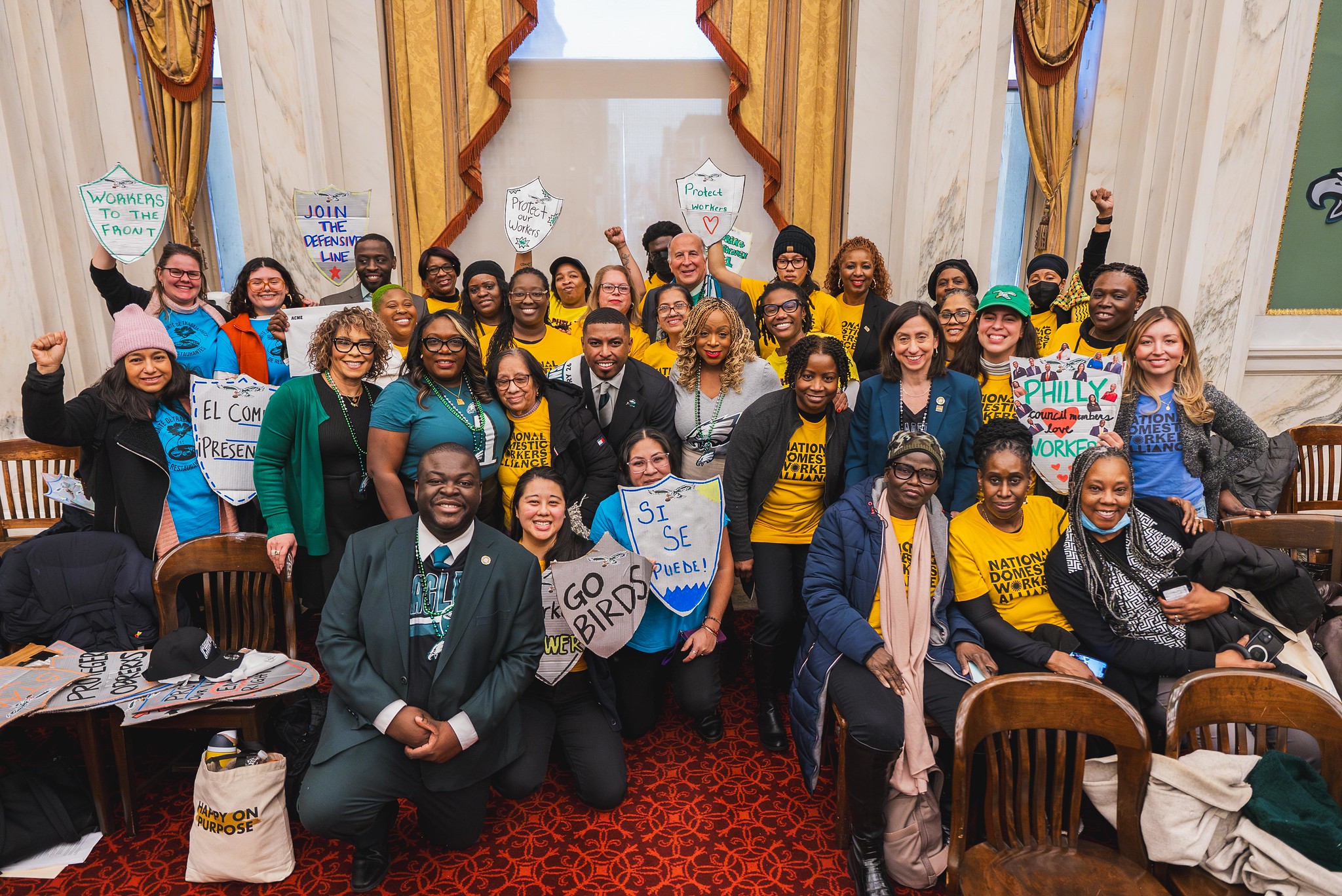FOR IMMEDIATE RELEASE: February 7, 2025
CONTACT: Daniela Perez, dperez@domesticworkers.org
Workers And Advocates Demand Stronger Protections Against Retaliation In Philadelphia, Introduce Anti-Retaliation Bill
The National Domestic Workers Alliance joins other workers to support the POWER Act, a bill to strengthen labor law enforcement and end retaliation.

Workers and advocates gather with Councilmember Kendra Brooks and POWER bill co-sponsors.
PHILADELPHIA – Today, workers, advocates, and labor organizations gathered at Philadelphia City Hall to testify in support of the POWER (Protect Our Workers, Enforce Rights) Act, a bill designed to protect workers from retaliation and strengthen enforcement of labor laws. The National Domestic Workers Alliance (NDWA), alongside the Philadelphia Council AFL-CIO, Philadelphia Black Workers Project, El Comité de Trabajadorxs de Restaurante, Community Legal Services, and the Sheller Center for Social Justice, led the call for stronger workplace protections.
The hearing began with a resolution honoring the Atlanta Washerwomen Strike of 1881, a historic strike in which Black washerwomen organized for fair wages and dignity. Workers today echoed their fight, emphasizing that retaliation, wage theft, and intimidation still plague workplaces across Philadelphia.
“The struggle of the Atlanta Washerwomen reminds us that workers—especially Black, immigrant, and women workers—have always had to organize for dignity,” said Arnetta Anderson, care worker and NDWA & We Dream in Black Philadelphia member. “The POWER Act is about making sure workers don’t have to risk their jobs just for demanding what’s fair. We need this law now.”
The POWER Act, introduced by Councilmember Kendra Brooks (At-Large), would provide the Office of Worker Protections with the enforcement tools necessary to hold abusive employers accountable. Workers from industries most impacted by retaliation—including domestic and care work, food service, and retail—spoke about wage theft, wrongful terminations, and employer intimidation that keep them from standing up for their rights.
“Our labor laws are meaningless if we don’t have the tools to enforce them, and the POWER Act is a vital next step to continue the progress we’ve made to protect workers in our city,” said Councilmember Kendra Brooks (At-Large). “Workers’ rights are under threat so it’s more important than ever that we strengthen our own Department of Labor here in Philadelphia. We can’t sit by while workers face threats of termination and deportation, simply for reporting an unsafe workplace, wage theft, or other violations of our labor laws.”
The Philadelphia Office of Worker Protections recovered over $327,000 in stolen wages in 2023, but this represents only a fraction of the wage theft occurring in the city. The POWER Act would expand enforcement capabilities and ensure that workers do not lose their jobs for speaking up.
Workers Speak Out: “We’re Still Fighting”
“Choosing this work should not mean choosing exploitation. I have cared for more than 10 children in my career, giving parents peace of mind while they work—yet as a domestic worker, I have faced job insecurity, sudden terminations, and no protections when I needed them most. We fought for and won the Domestic Worker Bill of Rights, but without an anti-retaliation law, it’s like being given a home without doors,” said Abby Ruiz, Nanny and NDWA & We Dream in Black Philadelphia member. “The POWER Act is the lock and key we need to finally have security in our workplaces. I will keep fighting—not just for myself, but for every worker who comes after me.”
“Latino workers face injustices every day—wage theft, wrongful terminations, and threats. Many of us remain silent out of fear of losing our jobs. But today, as we honor the struggle of the Black washerwomen, we are reminded that silence has never brought justice,” said Angélica, restaurant worker and leader of the El Comité de Trabajadorxs de Restaurante. “We need laws that protect workers from retaliation and ensure fair working conditions. I urge the city council to take action—passing this legislation is a critical step toward dignity and respect for all workers.”
“Similar to the Washerwomen, workers of color and immigrant workers still work in unsafe environments and they need the legislative protections that will help them stand up for themselves. Our legislation introduces a solution that allows workers to feel comfortable advocating for themselves when faced with unsafe working conditions and retaliatory employers.” said Kwame Acheampong, member of the Philly Black Worker Project.
The POWER Act: Key Protections for Workers
- Stronger Anti-Retaliation Protections: Employers who retaliate within 90 days of a worker asserting their rights will bear the burden of proof.
- Increased Employer Accountability: A public database of repeat offenders and fines for failing to inform workers of their rights.
- Expedited Enforcement: Faster investigations for severe retaliation cases, including wrongful firings and ICE threats.
Brooks’s legislation is co-sponsored by a veto-proof majority of City Councilmembers, including Councilmember Jim Harrity (At-Large), Councilmember Mark Squilla (1st District), Councilmember Nicolas O’Rourke (At-Large), Councilmember Jamie Gauthier (3rd District), Councilmember Rue Landau (At-Large), Councilmember Curtis Jones (4th District), Councilmember Isaiah Thomas (At-Large), Councilmember Jeffery Young (5th District), Councilmember Anthony Phillips (9th District), Councilmember Nina Ahmad (At-Large), Councilmember Quetcy Lozada (7th District), and Councilmember Cindy Bass (8th District).
With widespread support from labor unions and worker advocacy organizations, workers are urging City Council to pass the POWER Act swiftly to ensure no worker is left unprotected.
####
National Domestic Workers Alliance (NDWA) is the leading voice for dignity and fairness for millions of domestic workers in the United States. Founded in 2007, NDWA works for respect, recognition and inclusion in labor protections for domestic workers, the majority of whom are immigrants and women of color. NDWA is powered by over 70 affiliate organizations and local chapters and by a growing membership base of nannies, house cleaners and care workers in over 20 states. Learn more at
www.domesticworkers.org. NDWA is a non-partisan non-profit organization that does not endorse, support, or oppose any candidates for public office.
![Workers And Advocates Demand Stronger Protections Against Retaliation In Philadelphia, Introduce Anti-Retaliation Bill]()
![Workers And Advocates Demand Stronger Protections Against Retaliation In Philadelphia, Introduce Anti-Retaliation Bill]()

